SEO
Keyword Tracking Tools (To Suit All Budgets)
With so many options for tracking your website’s keywords, it’s hard to know which tools will suit both your business and your budget.
Let’s look at the options.
It’s easy to get started tracking keywords with Ahrefs. We have two core ways to track keywords to suit most budgets and businesses:
Free keyword rank checker (best for spot checks)
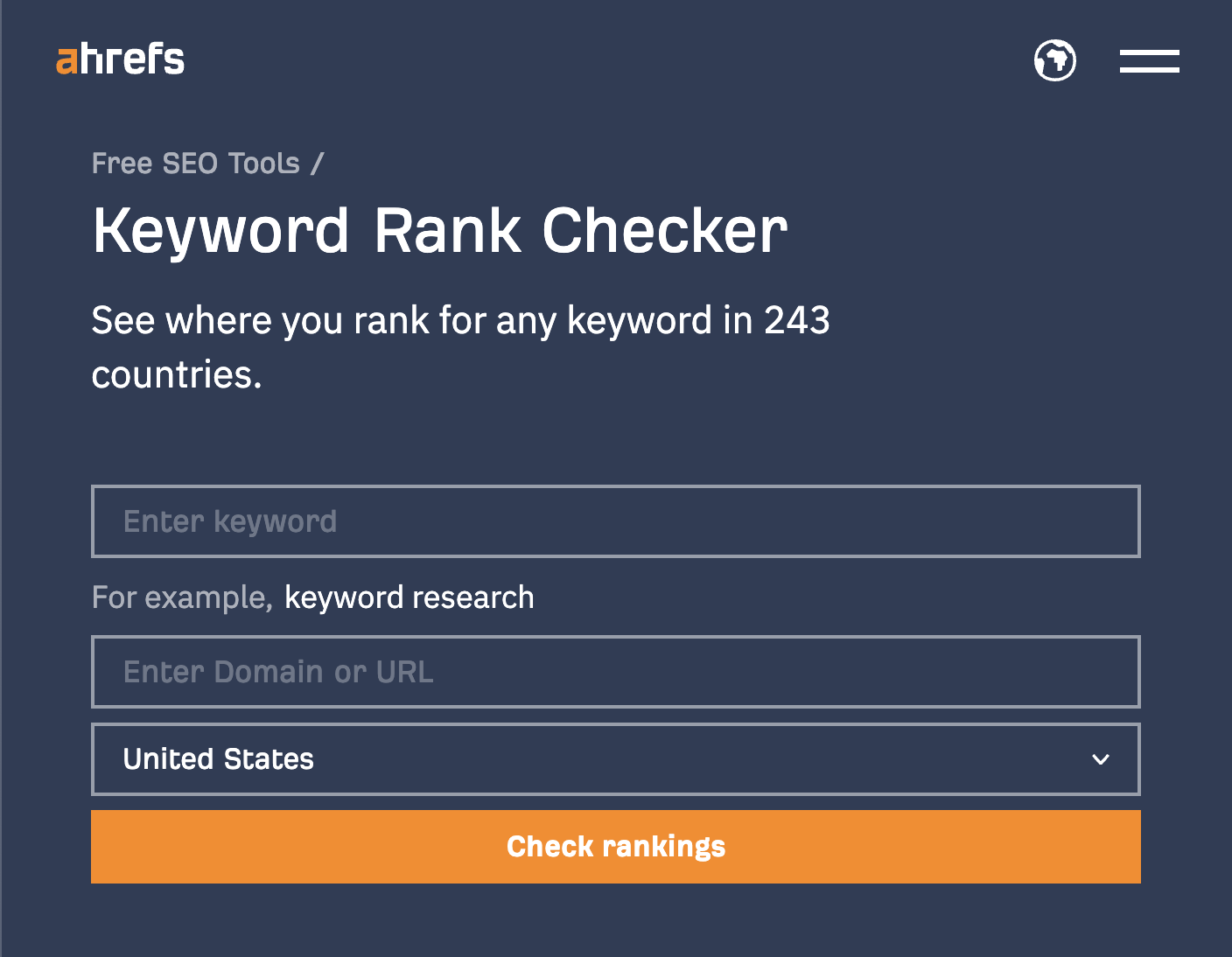
Ahrefs’ free keyword rank checker is perfect for those who want to check rankings for a few keywords and don’t want to be tied to a monthly subscription.
Here’s how to use it:
- Enter your keyword(s) in the first box
- Enter the domain or URL related to the keyword in the box below
- Select the location (by default, it’s set to the United States)
- Hit the Check rankings button
Once you have done that, you will get something that looks like the following:
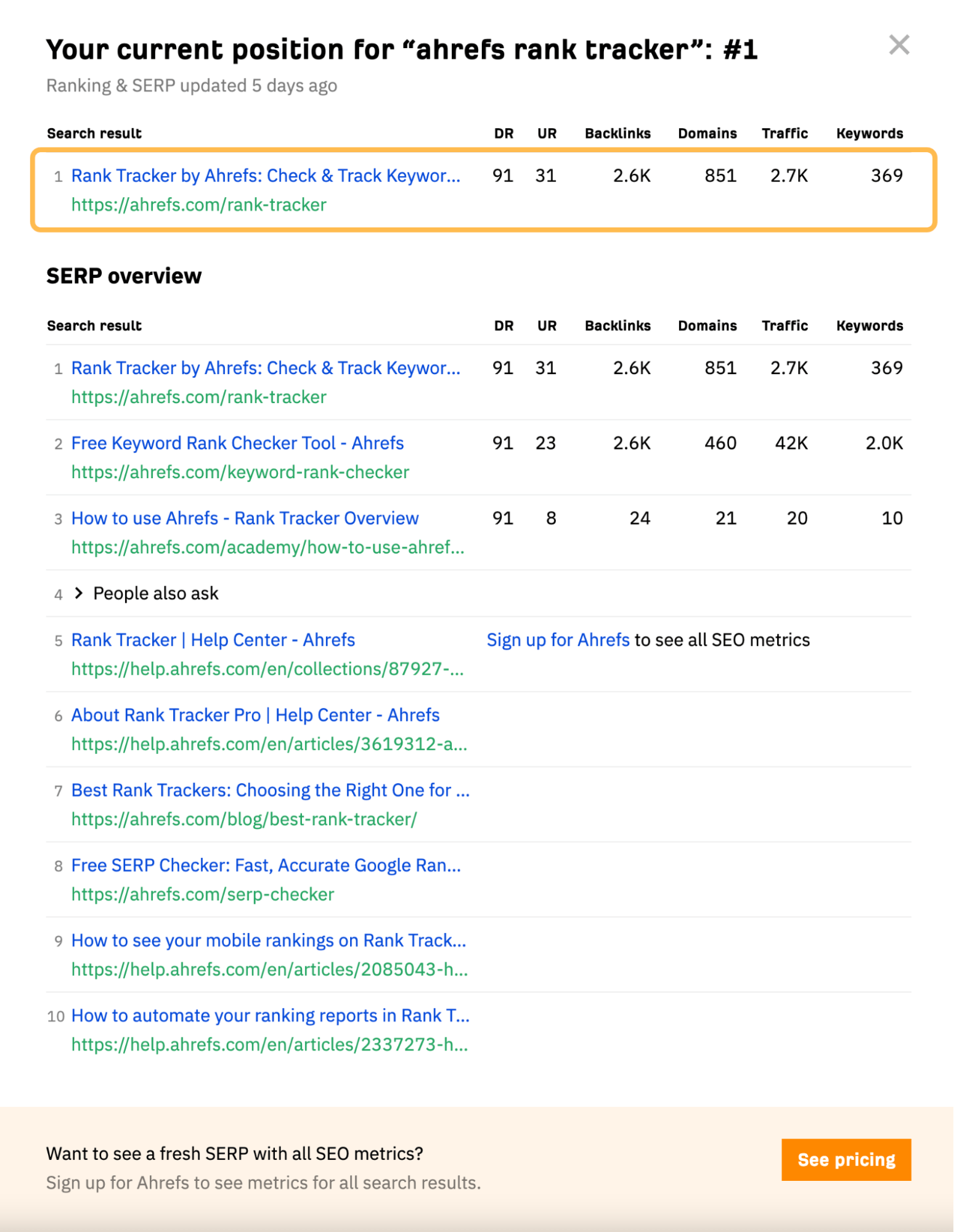
The free keyword rank checker gives an overview of the first page of the SERP, enabling you to conduct an analysis of the top results.
It also gives you access to Ahrefs’ data on the following:
- Domain Rating (DR)
- URL Rating (UR)
- How many backlinks the domain has
- How many domains it has
- Amount of organic traffic it is receiving
- Number of keywords that page is ranking for
From this data, you will understand whether you can rank for that keyword.
The tool also allows you to manually check any keyword. But sometimes, you need an automated solution to track more than one keyword.
That’s where Ahrefs’ Rank Tracker can help.
Rank Tracker (best for most websites)
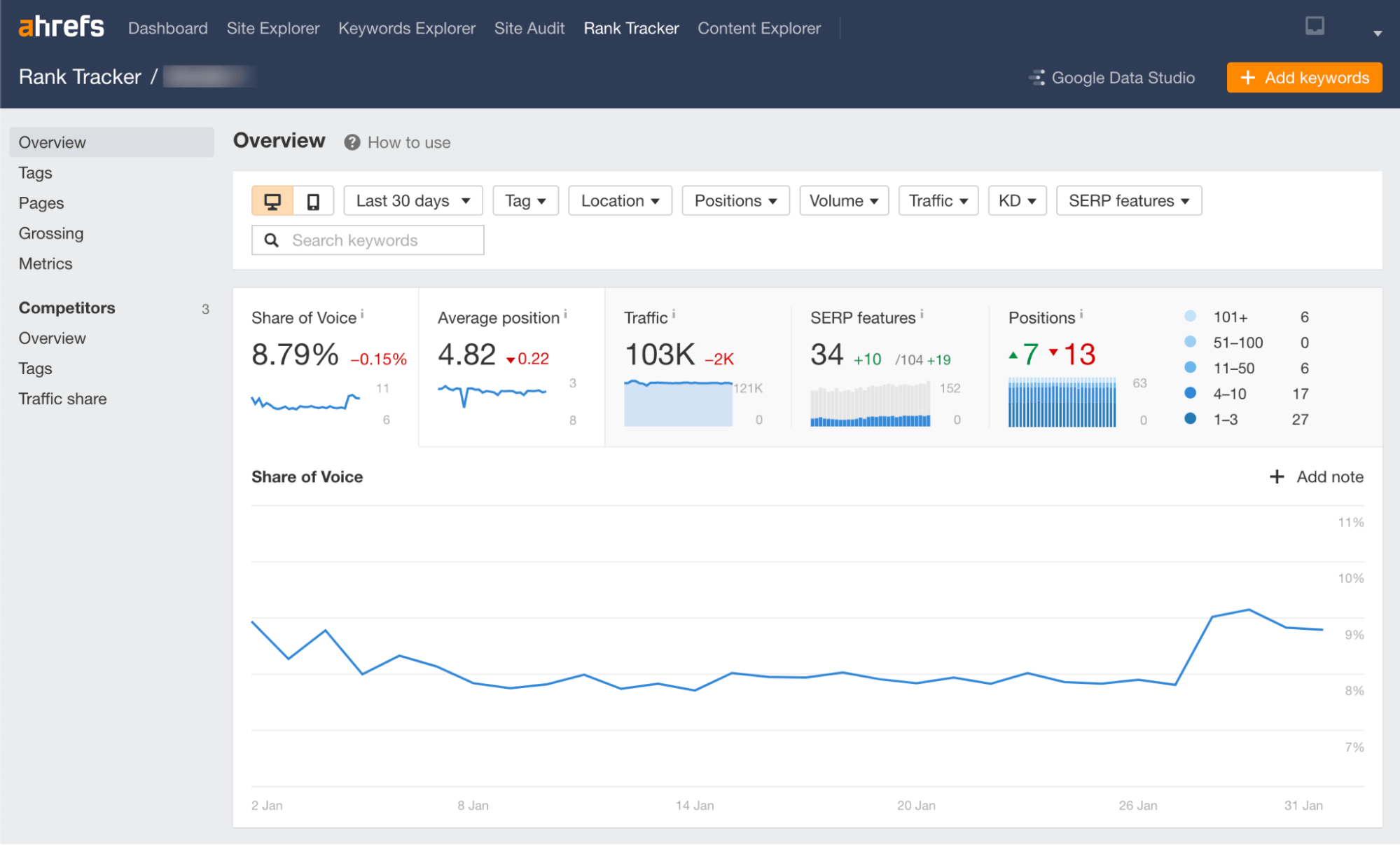
For most businesses, Ahrefs’ Rank Tracker will be the go-to solution for tracking a site’s keywords.
Unlike our free keyword rank checker, this tool allows you to track multiple keywords in your account, enabling you to monitor the total performance of your organic search campaign.
It also enables you to track and analyze the important elements of your campaign, such as:
- Share of voice
- Average position
- Organic traffic
- SERP features
You can also compare this data to your competitors’ websites:

And understand your performance across 13 different types of SERP features:
- Featured snippets
- Sitelinks
- Top stories
- Image packs
- Thumbnails
- Top ads
- Bottom ads
- Shopping results
- Knowledge cards
- Knowledge panels
- Videos
- Tweet box
- People also ask
You can also monitor SERP features against your competitors at a page or domain level.

This feature shows you where you need to focus your SEO efforts.
Another really useful feature is keyword tags. Tags allow you to group keywords to analyze performance at a group level.
Here’s an example of a tag group I made that groups the articles I have written for Ahrefs together.
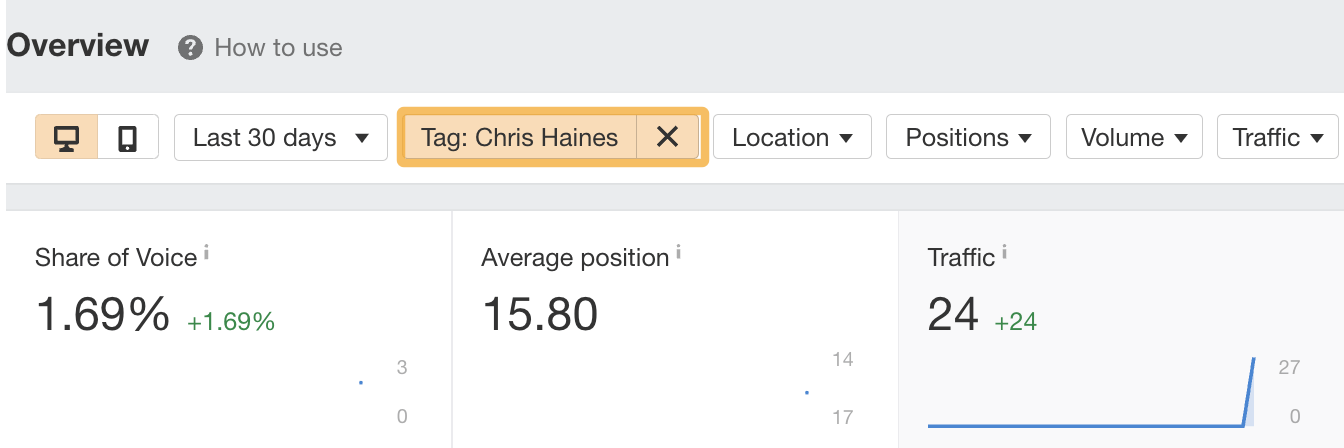
Using this strategy, you can start understanding which parts of your site are performing well and which parts need improvement.
Keyword tracking tools enable you to understand the performance and effectiveness of your SEO campaigns.
Learn more about Rank Tracker’s features here.
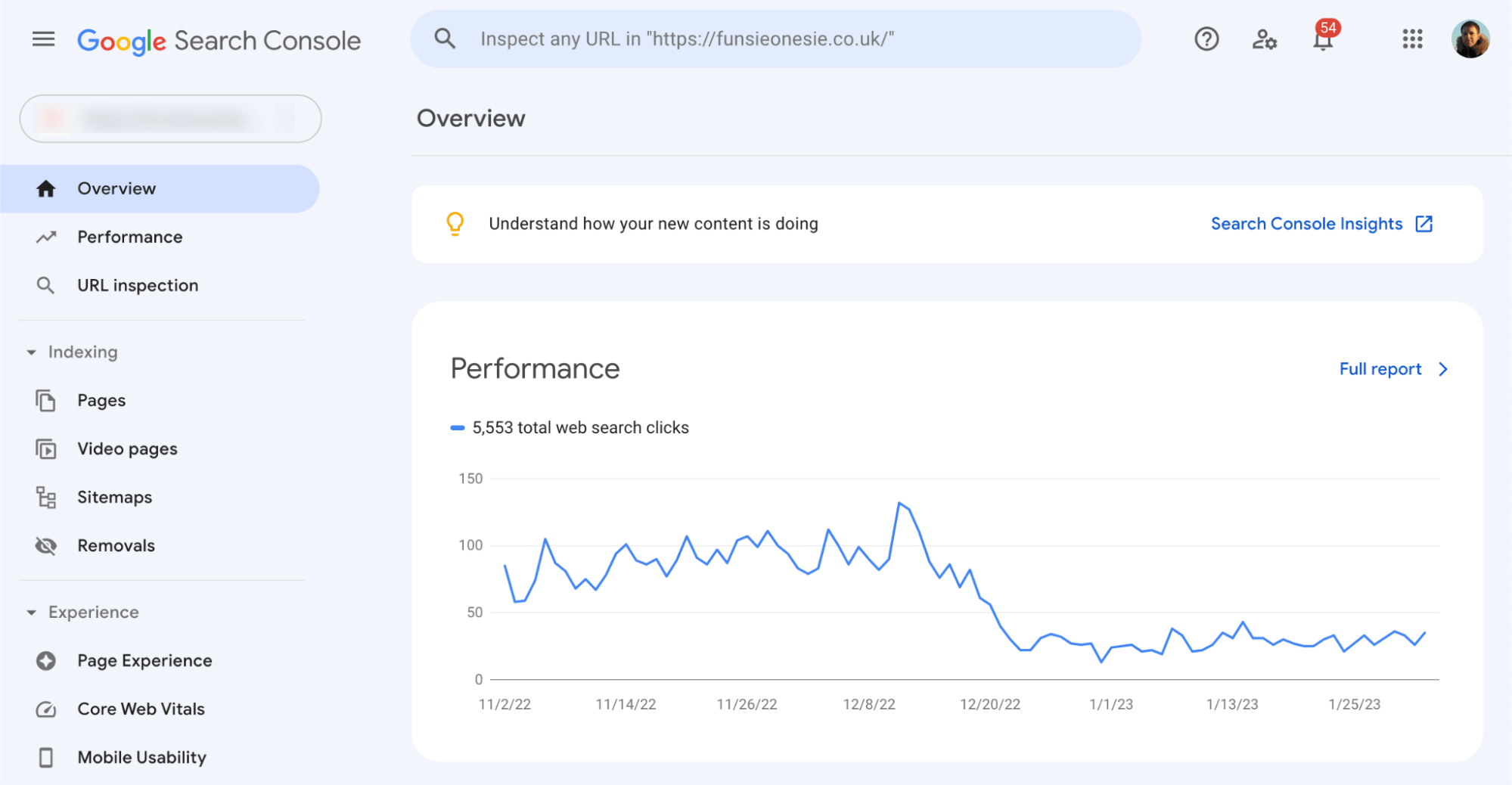
Google Search Console (GSC) allows you to monitor your site’s performance in Google. You can also track your average ranking position as well.
It tracks this in the Performance tab once you have verified your profile.

If you don’t want the hassle of logging in to GSC all the time, you can pull the performance data into Ahrefs by linking your website to your Google Search Console profile.
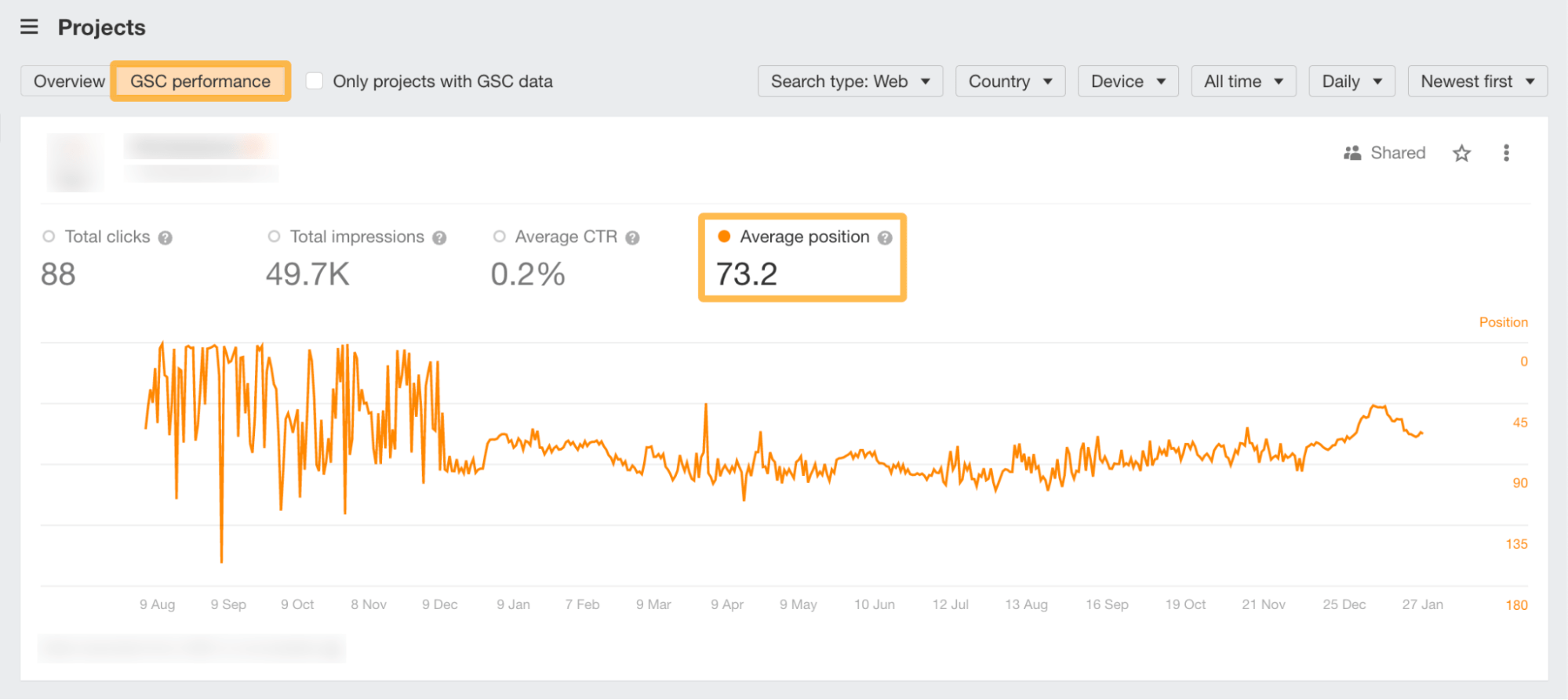
If you want to take it further, you can use Google Looker Studio (formerly Google Data Studio) to build a keyword-tracking dashboard.
The quickest, no-code way to do this is to use Ahrefs—you can simply click on the button highlighted below in Rank Tracker.

Once you have authorized your account on the next screen:
- Choose the primary Project that you want to track.
- Select the Device type below that.
- Check all the boxes on the right-hand side (Allow “X” to be modified in reports) all the way down the page.
- Hit Connect in the top right corner.
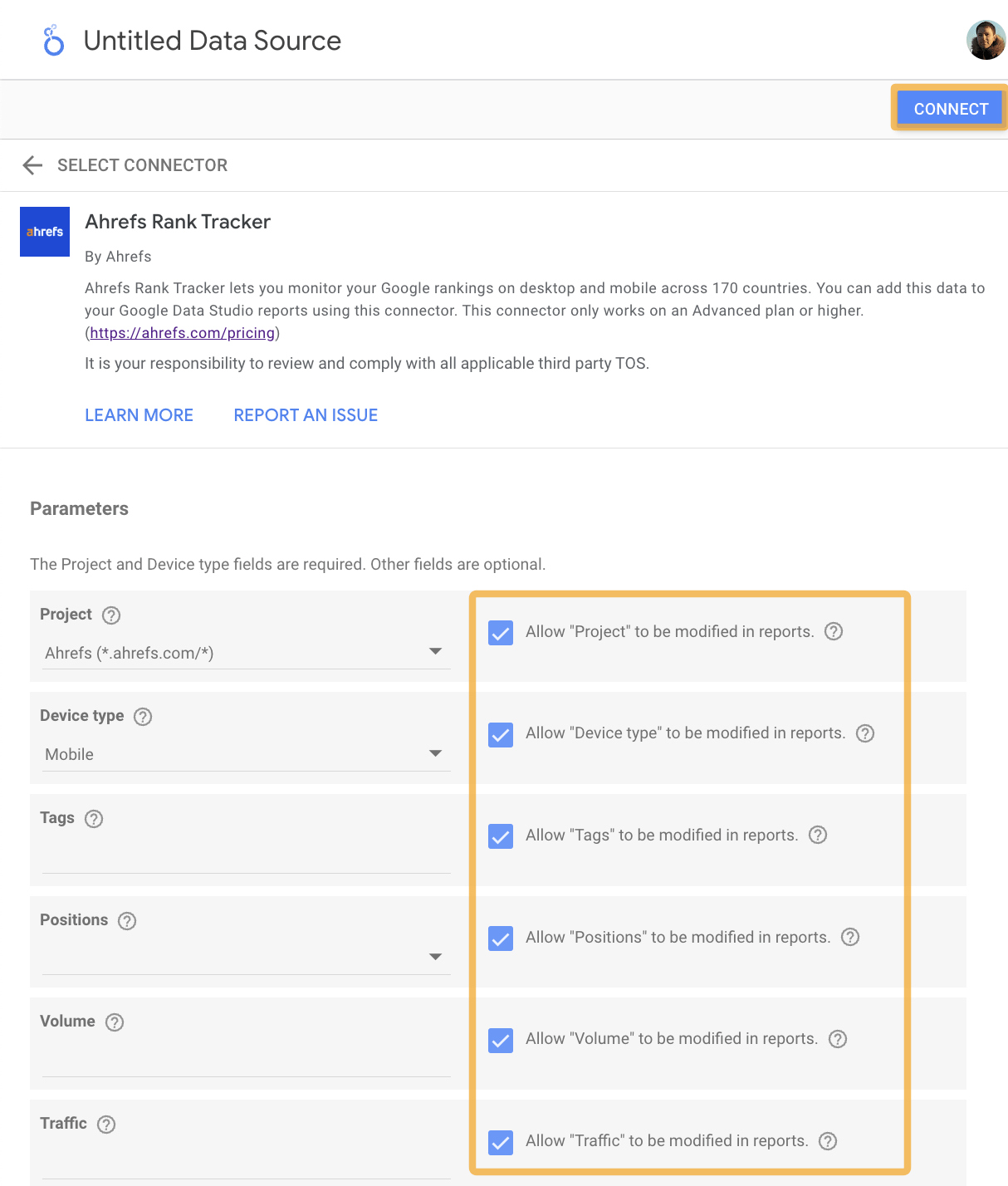
- On the next screen, click on Create Report.
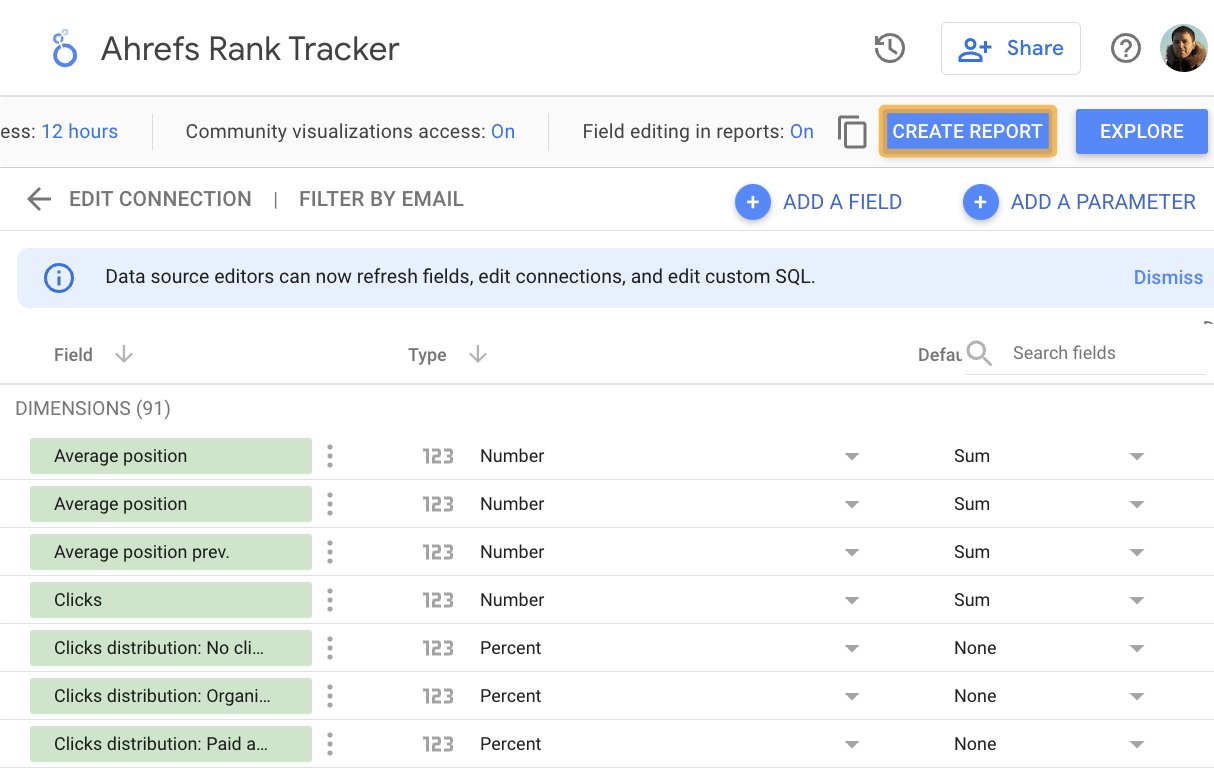
- You will then get a dashboard that shows an overview of your project.
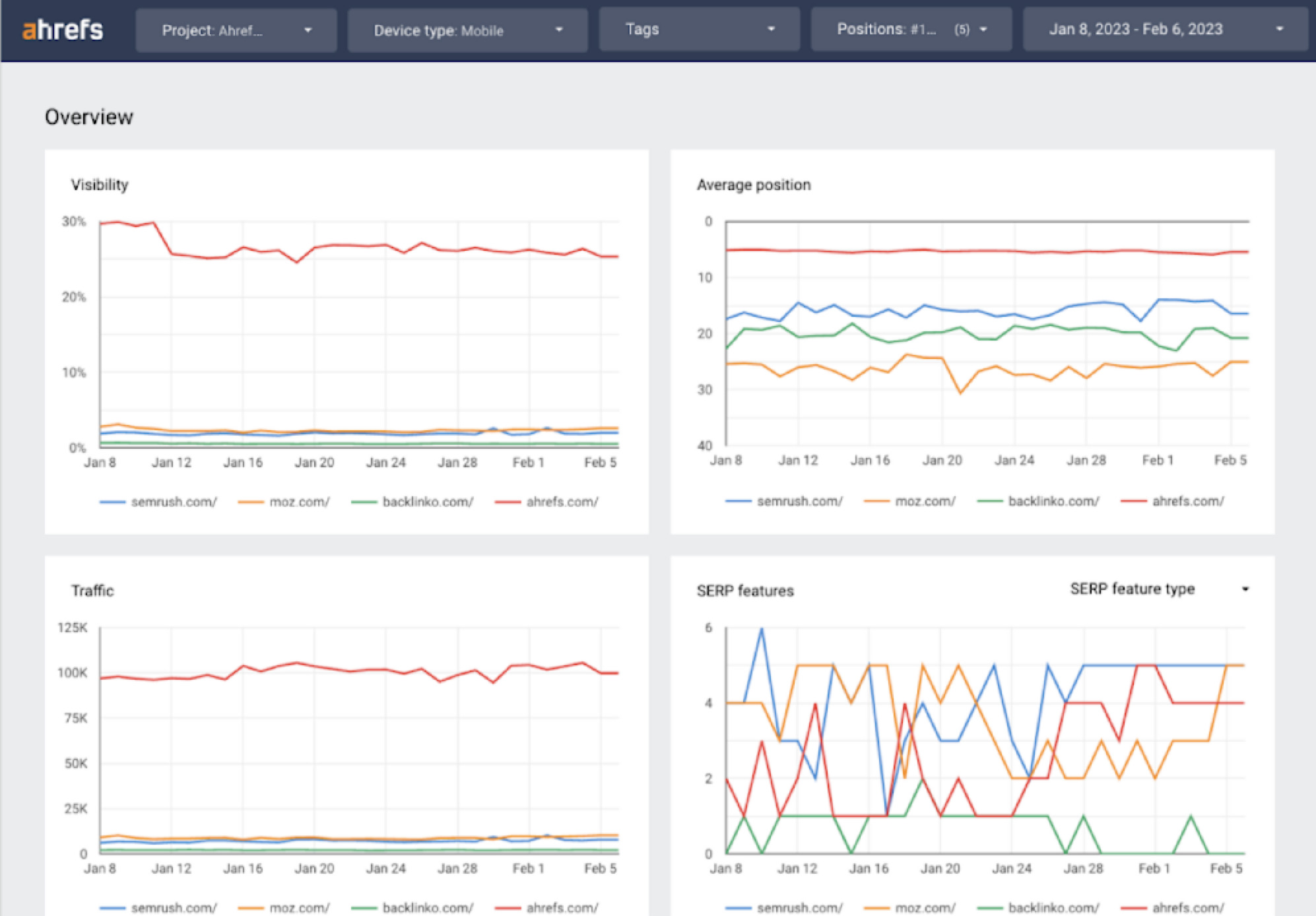
The screenshot shows the “Overview” page, but there are six other tabs on the left-hand side you can click on that will give you more detailed data on topics such as:
- Positions
- SERP features
- Competitors
- Tags
- Traffic share
- Keyword metrics
One of the main advantages of creating a dashboard is that you can take a periodic snapshot of the report and share it with other stakeholders automatically.
To do this:
- Click on the downward facing caret next to Share.
- Click on Schedule email delivery in the drop-down menu.

The email delivery screen will then pop up and allow you to schedule the report to be sent as a PDF.
Here’s an example of what the scheduling screen looks like:
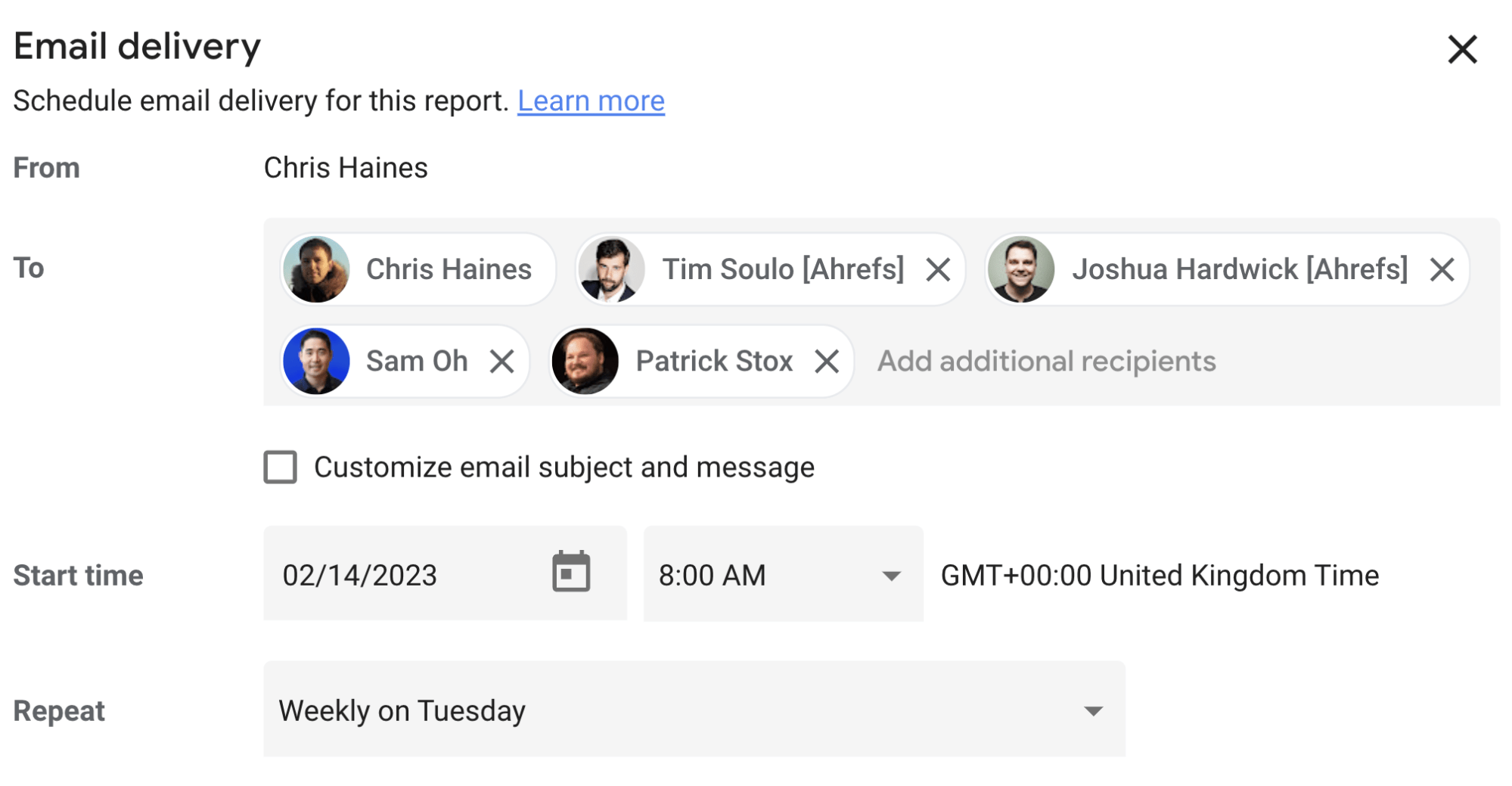
You can see that this setup can be a powerful and customizable option for SEO reporting.
This combination of tools for keyword tracking is popular with agency SEOs to keep their teams aware of their client’s organic performance.
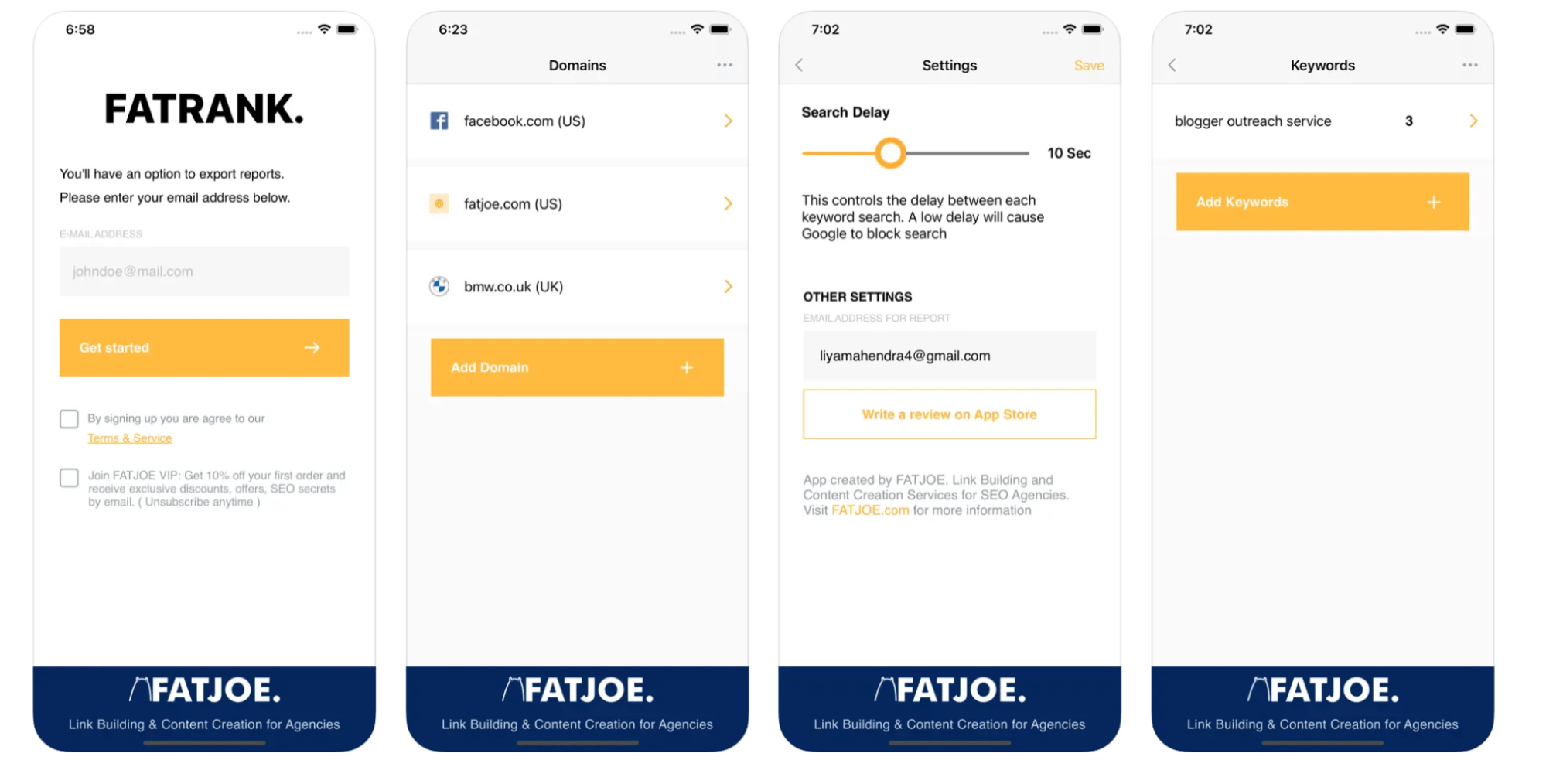
FatRank’s Keyword Checker is another way that you can quickly spot-check keywords. The great thing about this keyword checker is its format—you can use it as an app or a Google Chrome extension.
This means it’s great for checking a keyword’s ranking while you’re on the move, even if you don’t have your computer with you.
The Google Chrome extension has also got great feedback:
Both versions of this tool could be useful for SEOs who are traveling and want to quickly spot-check the rankings of their most important keywords.
The app and the extension are free to use, meaning that you can use them alongside your main keyword tracker if you want.
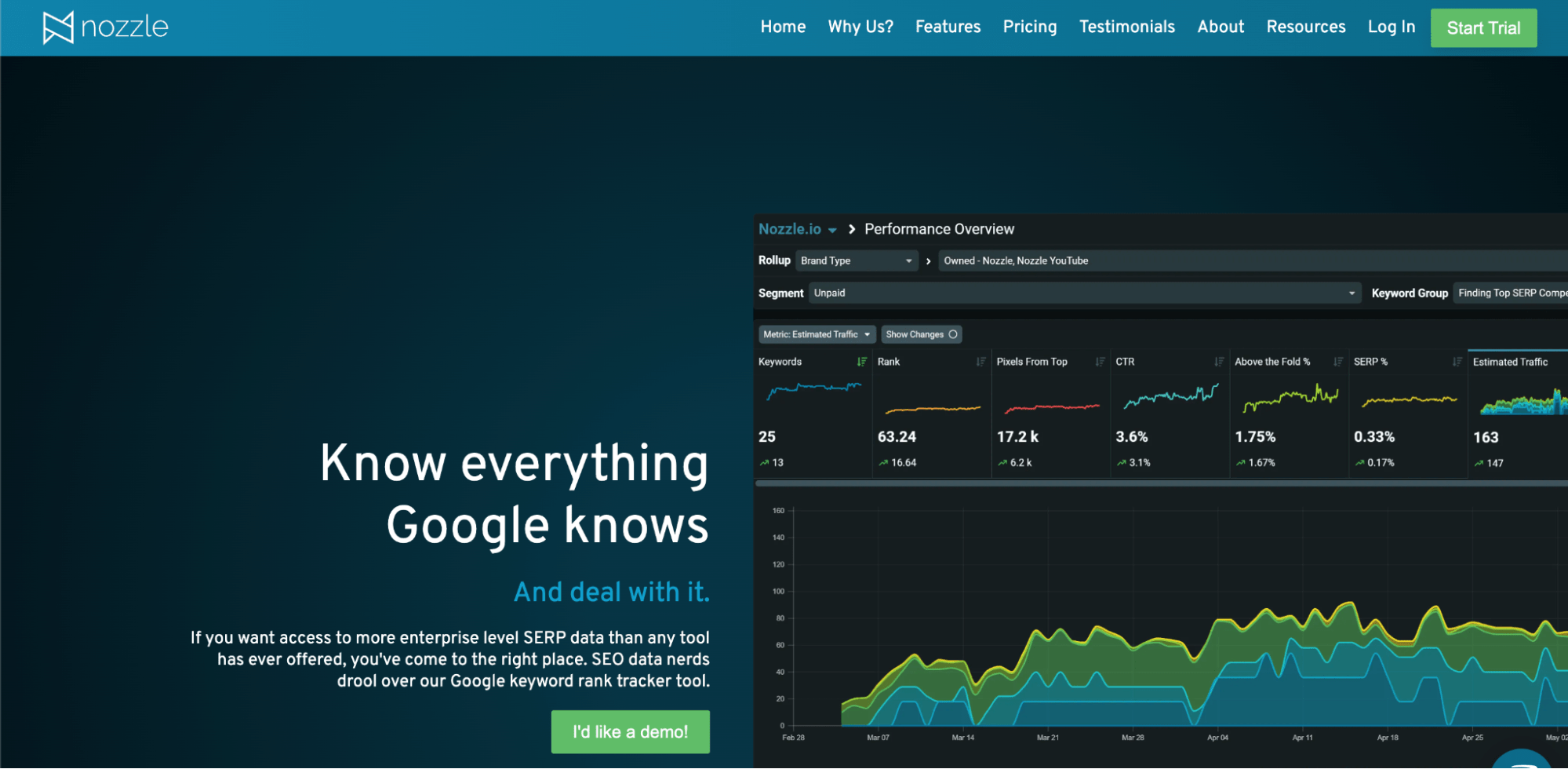
Nozzle is a keyword tracker with some interesting features and a luminescent-looking dashboard.
Here are a few stand-out features of Nozzle that I like:
- Ability to track keywords every five minutes – This is frequent. If you work in a fast-paced industry, this may be a useful feature for you.
- Track unlimited competitors for free – If you work in an industry where you need to keep tabs on a lot of competitors, this could be beneficial.
But what do SEOs think about it?
The tool has a lot of good reviews. Check out this example from JR Oakes and others below.
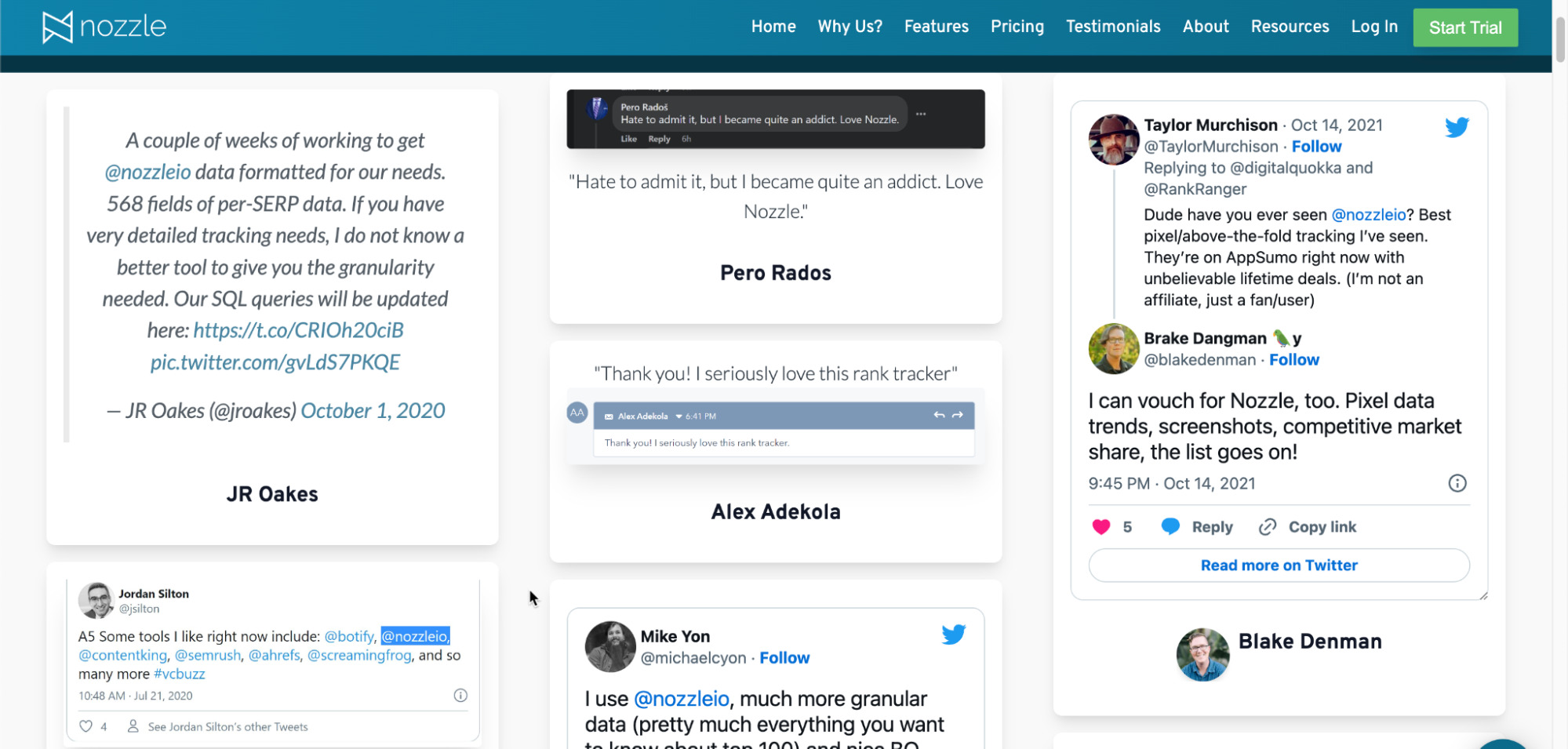
When it comes to pricing, Nozzle’s plans start at ~$49 and go up to ~$5K, so it has a wide range of pricing options for SMBs all the way up to the enterprise level.
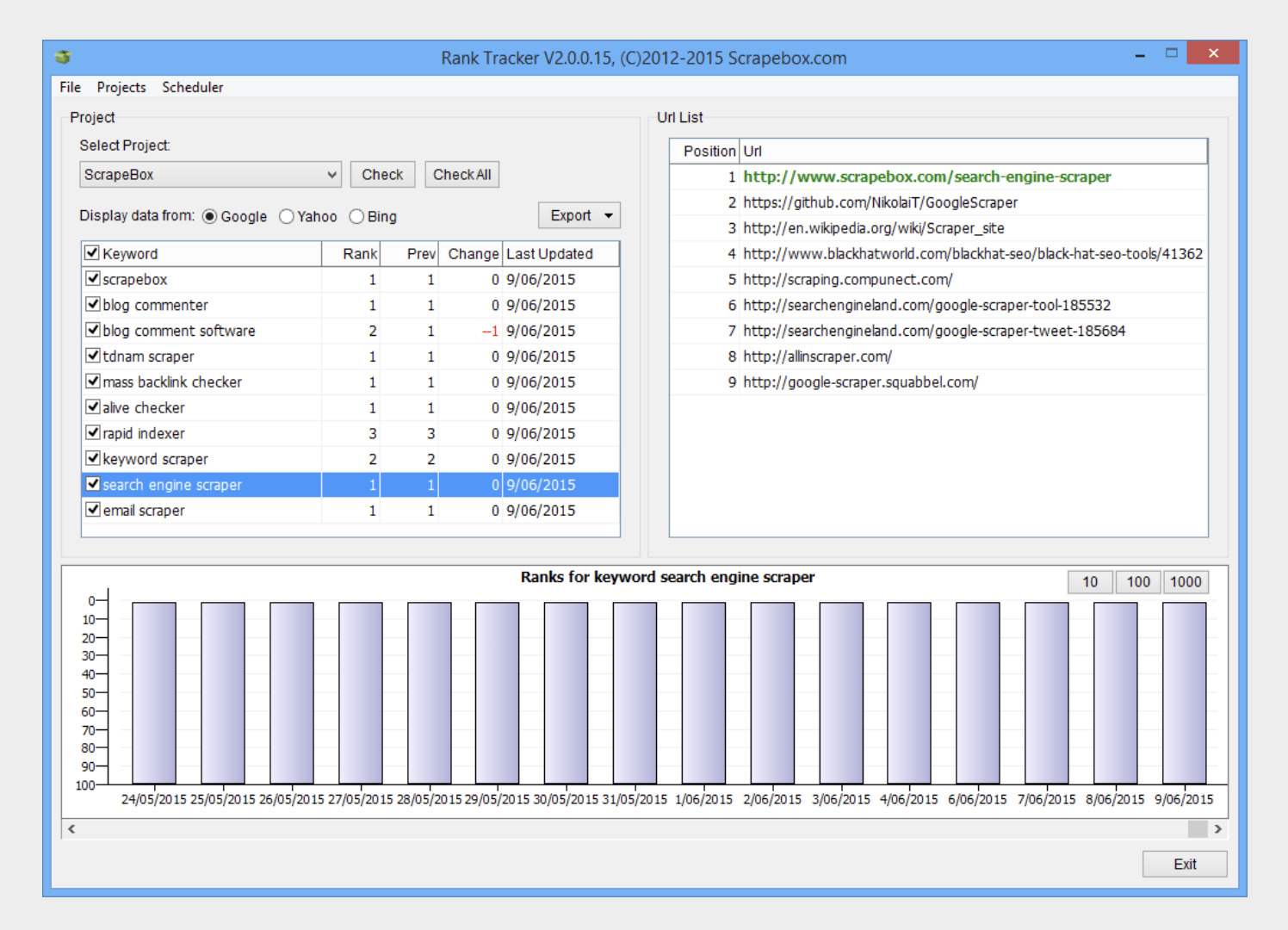
If you are happy to run something more technical, check out ScrapeBox. It’s been around since 2009—so quite a while.
As a result, the UI is perhaps a little more “rustic” than some of the options here, but the functionality is all there.
Looking at the features of this keyword tracker, we can see that it:
- Tracks unlimited sites.
- Tracks unlimited keywords.
- Supports Google, Yahoo, and Bing tracking.
- Has proxy support—using proxies is important to stop your activity from being blocked by search engines.
The basic package of ScrapeBox is $97. To get the rank tracking plugin for Windows, it costs an extra $37. So for under $150, you can get a functional keyword tracker.
If you are tech-savvy and want a fixed-cost, no-frills keyword tracker with no recurring subscription (apart from proxies), this could be a good option.
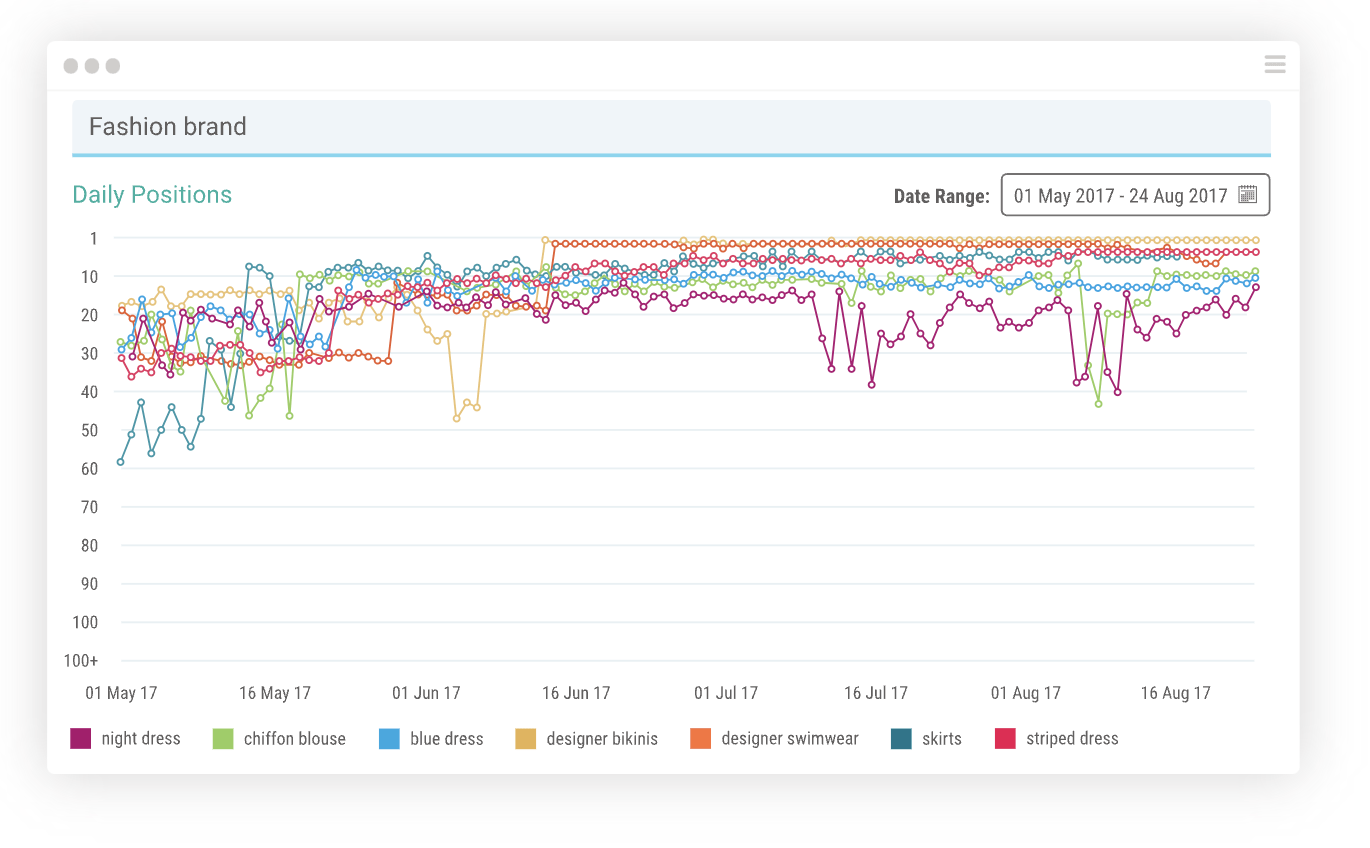
Pi Datametrics is a visual, client-friendly platform for keyword tracking. It allows you to dissect your organic performance in different ways with various tools.
Some features I like:
- Build visual business cases quickly within the platform
- Integrate with Google Analytics and Adobe Analytics
- Identify keyword cannibalization issues easily
- Add unlimited competitors
- Add unlimited locations
- Get industry insights into 650 business categories using the Pi Vault
This tool is a good option for enterprise e-commerce businesses or agencies that want to get buy-in for their SEO strategies from senior stakeholders.
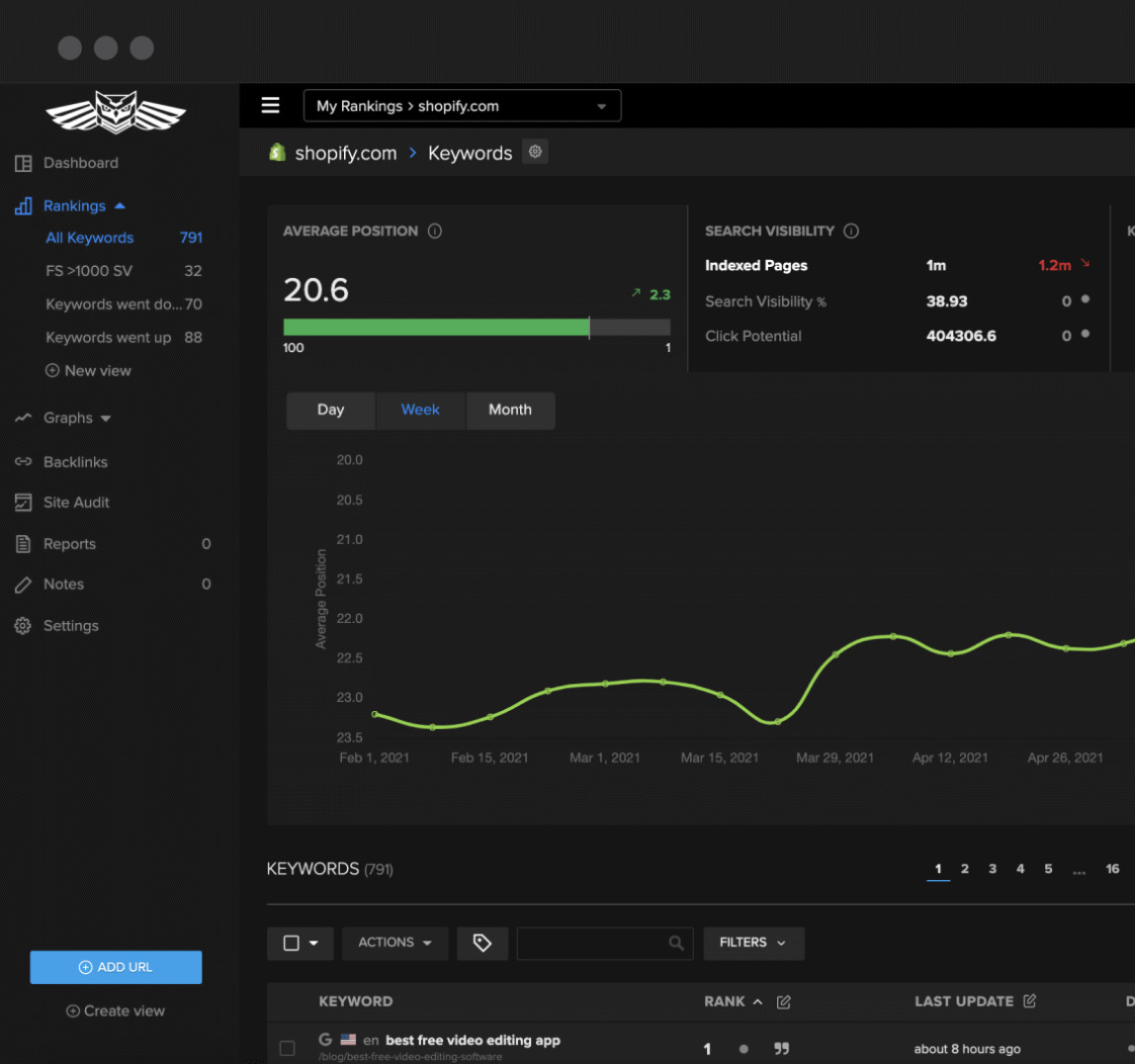
Nightwatch is a keyword tracker that allows you to “track search rankings from any location on earth.” Its emphasis is on accurate local tracking.
Nightwatch has some good features:
- Local rank tracking across 107,296 locations
- SERP feature tracking
- Custom keyword segmentation
- Automated reporting
- GSC and GDS integration
- White label reports at a higher price point
Prices start from $32 per month for 250 keywords.
This type of rank tracker may be useful for you if your business relies on local areas or perhaps if you are an agency that works with many local businesses.
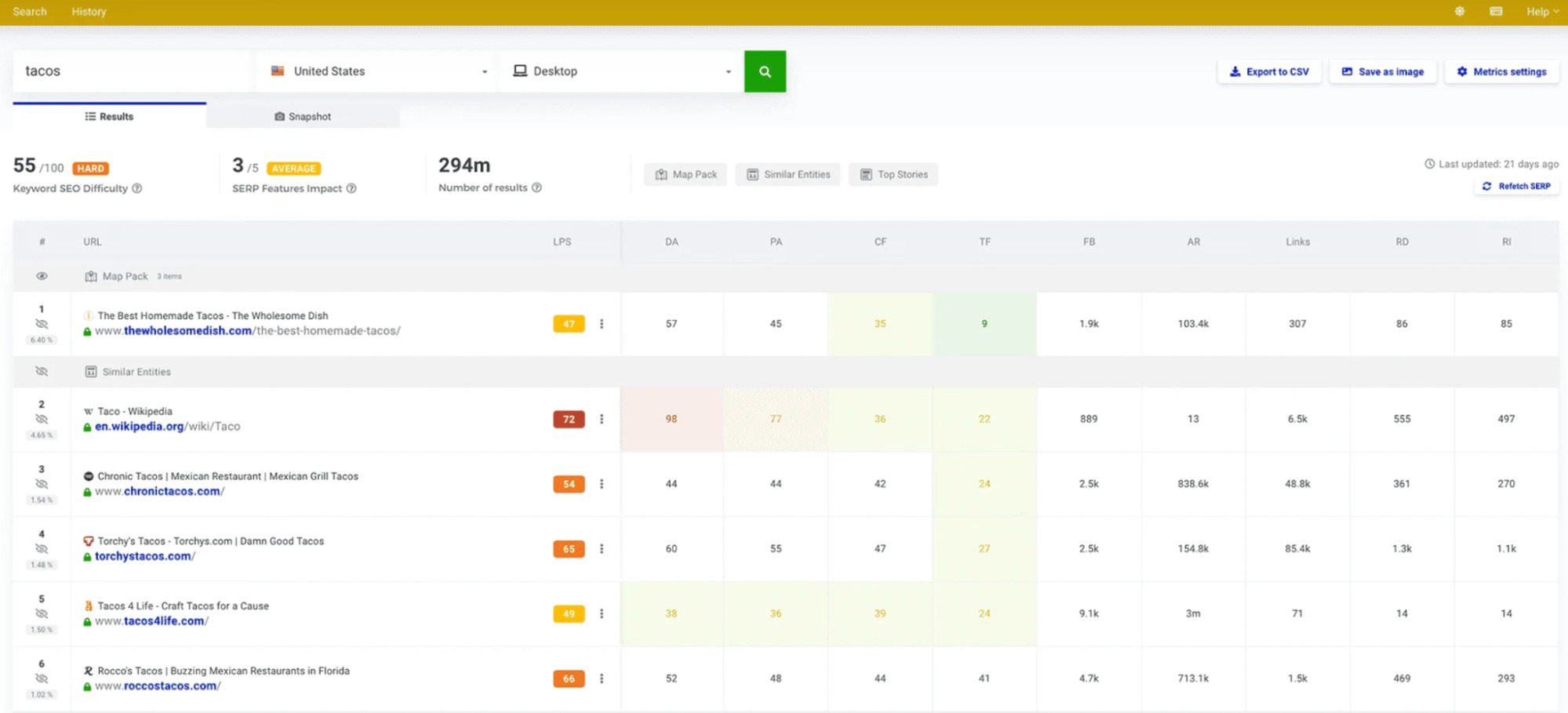
Mangools’ SERPwatcher is a clean, minimal-looking keyword tracker that doesn’t overcomplicate things.
When it comes to features, you get the following:
- Track desktop and mobile rankings
- Add keyword tags
- Daily keyword updates
- Track specific locations
- Easy setup—“from setup to daily rankings in 30 seconds”
In terms of pricing, you need to buy the total suite of products, but plans start at under $30 per month.
In my opinion, Mangools is most likely to appeal to solo entrepreneurs or affiliate marketers who are looking for an easy-to-use, cost-effective rank tracker.
Final thoughts
Keyword tracking tools help keep your SEO campaign accountable. They often come at a cost, but there are cheaper and even free options available to suit all budgets and websites.
Ultimately, the keyword tracking tool you choose depends on your business needs, priorities, and budget.
Got more questions? Ping me on Twitter. 🙂
SEO
Measuring Content Impact Across The Customer Journey

Understanding the impact of your content at every touchpoint of the customer journey is essential – but that’s easier said than done. From attracting potential leads to nurturing them into loyal customers, there are many touchpoints to look into.
So how do you identify and take advantage of these opportunities for growth?
Watch this on-demand webinar and learn a comprehensive approach for measuring the value of your content initiatives, so you can optimize resource allocation for maximum impact.
You’ll learn:
- Fresh methods for measuring your content’s impact.
- Fascinating insights using first-touch attribution, and how it differs from the usual last-touch perspective.
- Ways to persuade decision-makers to invest in more content by showcasing its value convincingly.
With Bill Franklin and Oliver Tani of DAC Group, we unravel the nuances of attribution modeling, emphasizing the significance of layering first-touch and last-touch attribution within your measurement strategy.
Check out these insights to help you craft compelling content tailored to each stage, using an approach rooted in first-hand experience to ensure your content resonates.
Whether you’re a seasoned marketer or new to content measurement, this webinar promises valuable insights and actionable tactics to elevate your SEO game and optimize your content initiatives for success.
View the slides below or check out the full webinar for all the details.
SEO
How to Find and Use Competitor Keywords

Competitor keywords are the keywords your rivals rank for in Google’s search results. They may rank organically or pay for Google Ads to rank in the paid results.
Knowing your competitors’ keywords is the easiest form of keyword research. If your competitors rank for or target particular keywords, it might be worth it for you to target them, too.
There is no way to see your competitors’ keywords without a tool like Ahrefs, which has a database of keywords and the sites that rank for them. As far as we know, Ahrefs has the biggest database of these keywords.
How to find all the keywords your competitor ranks for
- Go to Ahrefs’ Site Explorer
- Enter your competitor’s domain
- Go to the Organic keywords report
The report is sorted by traffic to show you the keywords sending your competitor the most visits. For example, Mailchimp gets most of its organic traffic from the keyword “mailchimp.”


Since you’re unlikely to rank for your competitor’s brand, you might want to exclude branded keywords from the report. You can do this by adding a Keyword > Doesn’t contain filter. In this example, we’ll filter out keywords containing “mailchimp” or any potential misspellings:


If you’re a new brand competing with one that’s established, you might also want to look for popular low-difficulty keywords. You can do this by setting the Volume filter to a minimum of 500 and the KD filter to a maximum of 10.


How to find keywords your competitor ranks for, but you don’t
- Go to Competitive Analysis
- Enter your domain in the This target doesn’t rank for section
- Enter your competitor’s domain in the But these competitors do section


Hit “Show keyword opportunities,” and you’ll see all the keywords your competitor ranks for, but you don’t.


You can also add a Volume and KD filter to find popular, low-difficulty keywords in this report.


How to find keywords multiple competitors rank for, but you don’t
- Go to Competitive Analysis
- Enter your domain in the This target doesn’t rank for section
- Enter the domains of multiple competitors in the But these competitors do section


You’ll see all the keywords that at least one of these competitors ranks for, but you don’t.


You can also narrow the list down to keywords that all competitors rank for. Click on the Competitors’ positions filter and choose All 3 competitors:


- Go to Ahrefs’ Site Explorer
- Enter your competitor’s domain
- Go to the Paid keywords report


This report shows you the keywords your competitors are targeting via Google Ads.
Since your competitor is paying for traffic from these keywords, it may indicate that they’re profitable for them—and could be for you, too.
You know what keywords your competitors are ranking for or bidding on. But what do you do with them? There are basically three options.
1. Create pages to target these keywords
You can only rank for keywords if you have content about them. So, the most straightforward thing you can do for competitors’ keywords you want to rank for is to create pages to target them.
However, before you do this, it’s worth clustering your competitor’s keywords by Parent Topic. This will group keywords that mean the same or similar things so you can target them all with one page.
Here’s how to do that:
- Export your competitor’s keywords, either from the Organic Keywords or Content Gap report
- Paste them into Keywords Explorer
- Click the “Clusters by Parent Topic” tab


For example, MailChimp ranks for keywords like “what is digital marketing” and “digital marketing definition.” These and many others get clustered under the Parent Topic of “digital marketing” because people searching for them are all looking for the same thing: a definition of digital marketing. You only need to create one page to potentially rank for all these keywords.


2. Optimize existing content by filling subtopics
You don’t always need to create new content to rank for competitors’ keywords. Sometimes, you can optimize the content you already have to rank for them.
How do you know which keywords you can do this for? Try this:
- Export your competitor’s keywords
- Paste them into Keywords Explorer
- Click the “Clusters by Parent Topic” tab
- Look for Parent Topics you already have content about
For example, if we analyze our competitor, we can see that seven keywords they rank for fall under the Parent Topic of “press release template.”


If we search our site, we see that we already have a page about this topic.


If we click the caret and check the keywords in the cluster, we see keywords like “press release example” and “press release format.”


To rank for the keywords in the cluster, we can probably optimize the page we already have by adding sections about the subtopics of “press release examples” and “press release format.”
3. Target these keywords with Google Ads
Paid keywords are the simplest—look through the report and see if there are any relevant keywords you might want to target, too.
For example, Mailchimp is bidding for the keyword “how to create a newsletter.”


If you’re ConvertKit, you may also want to target this keyword since it’s relevant.
If you decide to target the same keyword via Google Ads, you can hover over the magnifying glass to see the ads your competitor is using.


You can also see the landing page your competitor directs ad traffic to under the URL column.


Learn more
Check out more tutorials on how to do competitor keyword analysis:
SEO
Google Confirms Links Are Not That Important

Google’s Gary Illyes confirmed at a recent search marketing conference that Google needs very few links, adding to the growing body of evidence that publishers need to focus on other factors. Gary tweeted confirmation that he indeed say those words.
Background Of Links For Ranking
Links were discovered in the late 1990’s to be a good signal for search engines to use for validating how authoritative a website is and then Google discovered soon after that anchor text could be used to provide semantic signals about what a webpage was about.
One of the most important research papers was Authoritative Sources in a Hyperlinked Environment by Jon M. Kleinberg, published around 1998 (link to research paper at the end of the article). The main discovery of this research paper is that there is too many web pages and there was no objective way to filter search results for quality in order to rank web pages for a subjective idea of relevance.
The author of the research paper discovered that links could be used as an objective filter for authoritativeness.
Kleinberg wrote:
“To provide effective search methods under these conditions, one needs a way to filter, from among a huge collection of relevant pages, a small set of the most “authoritative” or ‘definitive’ ones.”
This is the most influential research paper on links because it kick-started more research on ways to use links beyond as an authority metric but as a subjective metric for relevance.
Objective is something factual. Subjective is something that’s closer to an opinion. The founders of Google discovered how to use the subjective opinions of the Internet as a relevance metric for what to rank in the search results.
What Larry Page and Sergey Brin discovered and shared in their research paper (The Anatomy of a Large-Scale Hypertextual Web Search Engine – link at end of this article) was that it was possible to harness the power of anchor text to determine the subjective opinion of relevance from actual humans. It was essentially crowdsourcing the opinions of millions of website expressed through the link structure between each webpage.
What Did Gary Illyes Say About Links In 2024?
At a recent search conference in Bulgaria, Google’s Gary Illyes made a comment about how Google doesn’t really need that many links and how Google has made links less important.
Patrick Stox tweeted about what he heard at the search conference:
” ‘We need very few links to rank pages… Over the years we’ve made links less important.’ @methode #serpconf2024″
Google’s Gary Illyes tweeted a confirmation of that statement:
“I shouldn’t have said that… I definitely shouldn’t have said that”
Why Links Matter Less
The initial state of anchor text when Google first used links for ranking purposes was absolutely non-spammy, which is why it was so useful. Hyperlinks were primarily used as a way to send traffic from one website to another website.
But by 2004 or 2005 Google was using statistical analysis to detect manipulated links, then around 2004 “powered-by” links in website footers stopped passing anchor text value, and by 2006 links close to the words “advertising” stopped passing link value, links from directories stopped passing ranking value and by 2012 Google deployed a massive link algorithm called Penguin that destroyed the rankings of likely millions of websites, many of which were using guest posting.
The link signal eventually became so bad that Google decided in 2019 to selectively use nofollow links for ranking purposes. Google’s Gary Illyes confirmed that the change to nofollow was made because of the link signal.
Google Explicitly Confirms That Links Matter Less
In 2023 Google’s Gary Illyes shared at a PubCon Austin that links were not even in the top 3 of ranking factors. Then in March 2024, coinciding with the March 2024 Core Algorithm Update, Google updated their spam policies documentation to downplay the importance of links for ranking purposes.
The documentation previously said:
“Google uses links as an important factor in determining the relevancy of web pages.”
The update to the documentation that mentioned links was updated to remove the word important.
Links are not just listed as just another factor:
“Google uses links as a factor in determining the relevancy of web pages.”
At the beginning of April Google’s John Mueller advised that there are more useful SEO activities to engage on than links.
Mueller explained:
“There are more important things for websites nowadays, and over-focusing on links will often result in you wasting your time doing things that don’t make your website better overall”
Finally, Gary Illyes explicitly said that Google needs very few links to rank webpages and confirmed it.
I shouldn’t have said that… I definitely shouldn’t have said that
— Gary 鯨理/경리 Illyes (so official, trust me) (@methode) April 19, 2024
Why Google Doesn’t Need Links
The reason why Google doesn’t need many links is likely because of the extent of AI and natural language undertanding that Google uses in their algorithms. Google must be highly confident in its algorithm to be able to explicitly say that they don’t need it.
Way back when Google implemented the nofollow into the algorithm there were many link builders who sold comment spam links who continued to lie that comment spam still worked. As someone who started link building at the very beginning of modern SEO (I was the moderator of the link building forum at the #1 SEO forum of that time), I can say with confidence that links have stopped playing much of a role in rankings beginning several years ago, which is why I stopped about five or six years ago.
Read the research papers
Authoritative Sources in a Hyperlinked Environment – Jon M. Kleinberg (PDF)
The Anatomy of a Large-Scale Hypertextual Web Search Engine
Featured Image by Shutterstock/RYO Alexandre
-

 PPC5 days ago
PPC5 days ago19 Best SEO Tools in 2024 (For Every Use Case)
-

 MARKETING7 days ago
MARKETING7 days agoStreamlining Processes for Increased Efficiency and Results
-
SEARCHENGINES6 days ago
Daily Search Forum Recap: April 17, 2024
-

 PPC7 days ago
PPC7 days ago97 Marvelous May Content Ideas for Blog Posts, Videos, & More
-

 SEO6 days ago
SEO6 days agoAn In-Depth Guide And Best Practices For Mobile SEO
-

 MARKETING6 days ago
MARKETING6 days agoEcommerce evolution: Blurring the lines between B2B and B2C
-
SEARCHENGINES5 days ago
Daily Search Forum Recap: April 18, 2024
-
SEARCHENGINES4 days ago
Daily Search Forum Recap: April 19, 2024















You must be logged in to post a comment Login